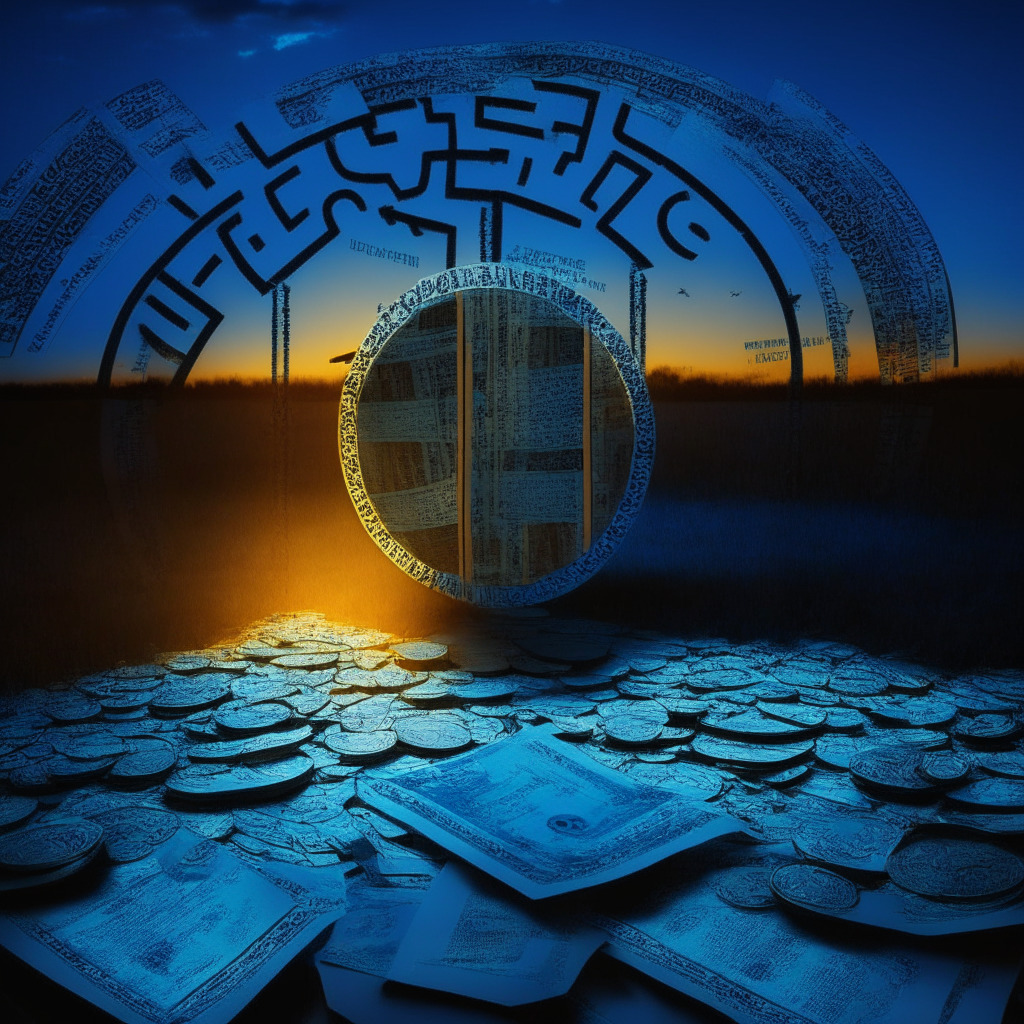The European Securities and Markets Authority (ESMA) has published its second consultation paper on cryptocurrency regulations, focusing on sustainable indicators for distributed ledgers, disclosure of insider information, technicalities within white papers, transparency measures and record-keeping for Crypto asset service providers. ESMA’s move aims to encourage a more sustainable, transparent, and accountable crypto-market.
Search Results for: European Union
European Commission’s Effort to Mitigate Cryptocurrency’s Environmental Impact: A Balanced Digital Future?
The European Commission has secured an 800,000 euro contract to develop methodology and sustainability standards that alleviate environmental hazards associated with cryptos. This move stems from concerns over how crypto transactions and mining may negatively affect the environment, economy, and society.
Unveiling France’s AI Ambitions: Iliad’s $106m Investment and the Future of European AI
French telecom firm Iliad is investing around $106 million USD in the local artificial intelligence (AI) sector, creating a laboratory for cutting-edge AI research in Paris. The lab will design general AI while possibly making use of Europe’s ‘most powerful cloud-native Ai supercomputer’ created by NVIDIA.
Investigating OpenAI: Balancing Technological Innovation and European Data Privacy Laws
Poland’s data protection watchdog is investigating OpenAI’s ChatGPT following a complaint accusing the firm of “unlawful, unreliable” data handling. The case surfaces significant matters about personal data protection and OpenAI’s compliance with GDPR, reflecting a broader concern about maintaining a balance between technological innovation and privacy.
European Digital Euro: An Unhurried Approach to Future Financial Stability
Mairead McGuinness, European Commissioner for Financial Stability emphasizes cautious approach to digital euro implementation. As cash loses popularity and commerce digitalizes, a future with digital central bank public money is anticipated. The transition could massively impact cross-border payments and global financial sectors, hence the need for careful scrutiny.
France’s Cryptocurrency Regulation Changes: The Beginning of a European Tectonic Shift
“France alters its registration prerequisites for cryptocurrency firms for greater harmony with the EU’s regulations under MiCA. These requirements, effective from Jan 1, 2024, aim to offer a clearer authorization procedure and elicit discussions about the need for increased regulations in the cryptocurrency market.”
Unpacking the European Commission’s Strategy for Web4: Crypto’s Emerging Role and Unmet Potential
“The EU’s new strategy for “Web4″ aims to create an open, secure, trustworthy, and fair digital environment. However, the EU needs to rectify its hesitation in endorsing cryptocurrencies, like Bitcoin, to maintain a tech-savvy image. Incorporating digital innovations such as DeFi, ERC-4626 and bridging the gap between digital and physical spaces are the forward-looking goals.”
Binance Indictment by SEC: European Authorities Respond and Upcoming MiCA Regulations
The SEC’s indictment of Binance has prompted reactions among European authorities, with increasing scrutiny over its operations and financial structure. Binance now prepares for upcoming MiCA regulations in the EU, highlighting the importance of transparency and compliance for maintaining trust.
European MiCA Consultations: The Path to Crypto Regulatory Clarity and Environmental Concerns
The European Securities and Markets Authority (ESMA) will launch a three-part consultation process for the Markets in Crypto Assets (MiCA) framework, aiming to establish a consistent regulatory environment for cryptocurrencies in the EU. This will cover authorization, governance, conflicts of interest, and complaint handling procedures, ultimately benefiting crypto enthusiasts and businesses alike.
European Access to Lido DAO ETP: Exciting Opportunity or High-Risk Gamble?
Swiss-based 21Shares introduces a new crypto exchange-traded product (ETP), offering exposure to Lido DAO, a leader in the liquid-staking ecosystem. Available in 22 European Union countries, the ETP carries substantial risks and is classified as the highest risk class, demanding investor caution.
The Battle Over Crypto Ads: Tech Giants vs European Regulators and Consumer Advocacy Groups
The European Consumer Group (BEUC) has lodged a complaint with the European Commission regarding tech giants like Meta and Alphabet, urging stricter crypto advertising policies in the EU due to concerns about potentially misleading ads on platforms like Instagram, YouTube, TikTok, and Twitter. The group seeks better protection against crypto scams and false promises.
Cyprus’ Crackdown on Unregulated Cryptocurrency: Necessary Protection or Innovation Stifle?
“Cyprus proposes to penalize Crypto Asset Service Providers (CASPs) operating without licenses, with penalties up to €350,000 or five years imprisonment. This rule aims at uniformity in the European Union and protecting investors from financial hazards associated with illicit activities and money laundering.”
Crossroads of Innovation and Security: EU’s Proposed Regulations on Large-Scale AI Models
The European Union is reportedly discussing stricter regulations on large-scale language models (LLMs) like OpenAI’s GPT-4 and Meta’s Llama 2, aimed at controlling these models without overloading start-ups. These discussions touch on the implications of LLMs, user safety, and ethical AI deployment, mirroring the approach of the EU’s Digital Services Act.
Europe’s Rising Role in Driving Institutional Cryptocurrency Adoption: A Regulatory Perspective
The recent Blockchain Expo in Amsterdam highlighted Europe as the key driver for institutional cryptocurrency adoption due to its favorable regulatory climate. The European Union’s Markets in Crypto-Assets (MiCA) regulation is implicated as a safety net, offering a regulatory framework for the emerging sector and ensuring user protection, which are lacking in countries like the United States.
Shifting Sands: How Stringent Crypto Regulations Impact the Future of Exchange Platforms in Europe
“Crypto exchange Gemini discontinues its services in the Netherlands due to stringent regulations instituted by the Dutch central bank. Gemini intends to comply with the Markets in Crypto-Assets Regulation (MiCa), before reopening for Dutch users. These regulatory tightening trends raise questions about the future of crypto platforms in the European Union.”
Navigating the Storm: EU’s MiCA and the Future of Stablecoins in Europe
“The European Union’s upcoming Markets in Crypto Assets (MiCA) regulation has raised concerns about the potential delisting of all stablecoins in Europe by June 30. MiCA aims to streamline processes and enhance oversight. However, its provisions concerning stablecoins are causing apprehension, especially as they seem to contradict the aspirations of many issuers for decentralization.”
EU’s DAC8 Cryptocurrency Tax Reporting Rule: Boost for Accountability or Over-Regulation Menace?
The Directive on Administrative Cooperation (DAC8) rule, aimed at monitoring and evaluating all cryptocurrency transactions within the European Union, was recently approved at the EU parliament. The goal is to assist tax authorities in tracking crypto-assets trade and profits, reducing tax fraud and evasion. However, it raises questions about potential over-regulation and its impact on member countries’ autonomy.
Binance’s Uplift Amid Regulatory Scrutiny: Balancing Decentralization and Standardization
“Binance regional markets head Richard Teng insists that despite facing regulatory scrutiny, the exchange remains financially secure and welcomes said scrutiny. Teng expresses support for harmonized standards for the cryptocurrency industry, like the European Union’s Markets in Crypto-Assets (MiCA) regulation. This standardization, however, could challenge the decentralization ethos of blockchain technology.”
Coinbase’s Global Game Plan: Tapping into Foreign Markets Despite US Regulatory Tensions
Coinbase, a global digital asset exchange, plans to expand its operations into Canada, the UK, Australia, Brazil, Singapore, and the European Union, prioritizing these markets due to more progressive digital asset regulations. This decision came after acknowledging restrictive regulations in the US market as a significant impediment. Key strategies for expansion include partnering with banks, payment service providers, and increasing local community engagement.
Euro Digital Currency: Savior or Stumbling Block? A Review of the Potential Pitfalls and Progress
The digital euro by the European Union could face obstacles in non-euro states due to necessary international agreements between the EU and third-countries. Complex issues surrounding Central Bank Digital Currency (CBDC) usage, like unresolved legal queries concerning usage and jurisdiction, may hinder its implementation.
Green Shift or Market Misstep? Europe’s First Article 8 Bitcoin ETF Challenges and Opportunities
The European first-of-its-kind Bitcoin ETF dubs itself as ‘environmental investing’, following the European Union’s environmental, social and governance investing standards. However, critics express scepticism regarding the sustainability of this model due to Bitcoin’s massive energy consumption. These contrasting stories capture the dynamism of the crypto market.
Crypto Crime Investigation Training Surge in Ukraine: A Move Towards Global Crypto Compliance?
Ukrainian law enforcement officers are being trained by European Union officials in crypto crime investigation, highlighting the Ukrainian government’s dedication to aligning its crypto policies with those of Brussels. The sessions focus on tracking crypto transactions and identifying their participants, given the potential misuse of these transactions for illegal activities. This aligns with the BEB’s focus on combating financial crime in the crypto industry.
EU’s Data Act: A Double-Edged Sword for Blockchain and DeFi?
The European Union’s Data Act introduces regulations that could reshape the digital landscape, causing concern among blockchain experts due to provisions like a “kill switch” for smart contracts. This could have unforeseen consequences due to a lack of clarity on safe termination conditions, creating uncertainty in the world of blockchain and decentralized finance (DeFi).
Dutch Central Bank Recognizes Crypto.com: A Regulatory Triumph or a Compliance Challenge?
“In a significant shift in regulatory climates, Crypto.com has been officially registered by the Dutch central bank, signaling its commitment to compliance. This comes after issues faced by Binance and Coinbase. The upcoming European Union laws for 2024 could necessitate not just registration, but licensing, implying checks on governance and fiscal health. This points to the need for ongoing dialogue about regulations.”
Navigating French Crypto Regulation: How SG Forge Acquired First Full DASP License
SG Forge, Societe Generale’s digital asset unit, has procured a Digital Asset Service Provider (DASP) license and become the first entity to achieve this certification in France. The company’s strides in adhering to regulatory requirements highlight the importance of alignment with the European Union’s crypto regulations, providing assurance of both compliance and banking security.
EU’s Techno-Futurism: Embracing Metaverse and Crypto While Navigating Regulatory Hurdles
“The European Union recently ratified the Markets in Crypto-Assets framework into law, presenting a comprehensive legislative standard for the evolving cryptoverse. Future plans include leading developments in the metaverse, with a focus on creating an open, secure and inclusive digital environment, as well as upholding EU values and fundamental rights.”
Google’s Bard Launch in EU and Brazil: Triumph Amid Regulatory Hurdles & Dwindling Novelty
Google’s AI tool, Bard, has recently launched in the European Union and Brazil despite regulatory complications. Bard, now able to respond in over 40 languages, encompasses new features including spoken responses and image analyses. However, its release coincides with a class-action lawsuit in the US accusing Google of misusing personal data for AI system training.
Navigating the MiCA Legislation: Impacts on Private Stablecoins and the Future of Crypto Regulation
The European Union enacted the Markets in Crypto-Assets (MiCA) legislation, sparking controversy with a daily 200 million euros transaction cap for private stablecoins. This is meant to protect investors from large-scale stablecoin failures which could impact traditional financial systems. However, critics argue it could stifle innovation within the crypto landscape.
Bakkt Aims for International Expansion Amidst Unclear US Regulatory Landscape
Bakkt, a crypto-economy firm, expresses interest in expanding its operations to Hong Kong, the United Kingdom, and some European Union regions due to favorable regulatory environments. This follows Bakkt’s acquisition of Apex Crypto, leveraging partners like Webull, Public.com, and Stash to facilitate global growth. However, pesky regulatory uncertainties in the U.S. complicate alliances and force delisting of certain cryptocurrencies.
Binance Backpedals on Delisting Privacy Coins in EU: A Balancing Act between Regulation and Innovation
Binance has reversed its decision to delist certain privacy coins within the European Union, following adjustments to comply with regional regulations. However, crypto like Monero, Beam, MobileCoin, Firo, and Horizen still face potentially being delisted. This move aligns with the EU’s modernized MiCA regulatory standards for cryptocurrency firms. As regulators seek balance, there’s concern about stifling innovation and overreaching into the privacy-focused crypto space.
EU’s New Crypto Regulations: Balancing Innovation and Financial Stability
The European Union has reached a political agreement on updating the Capital Requirements Regulation and Directive, introducing new regulations for crypto assets to address concerns over “unbacked cryptocurrencies” entering the traditional financial system. The updated regulations aim to boost the strength and resilience of banks, with a “transitional prudential regime for crypto assets” included.
EU Bank Capital Laws: Balancing Crypto Growth and Financial System Stability
The European Union reaches a political agreement on new bank-capital laws aimed at keeping unbacked cryptocurrencies like Bitcoin and Ethereum out of the traditional financial system. Critics claim these rules may stifle the crypto market’s growth, while supporters argue they’re necessary for maintaining financial system integrity and stability.































